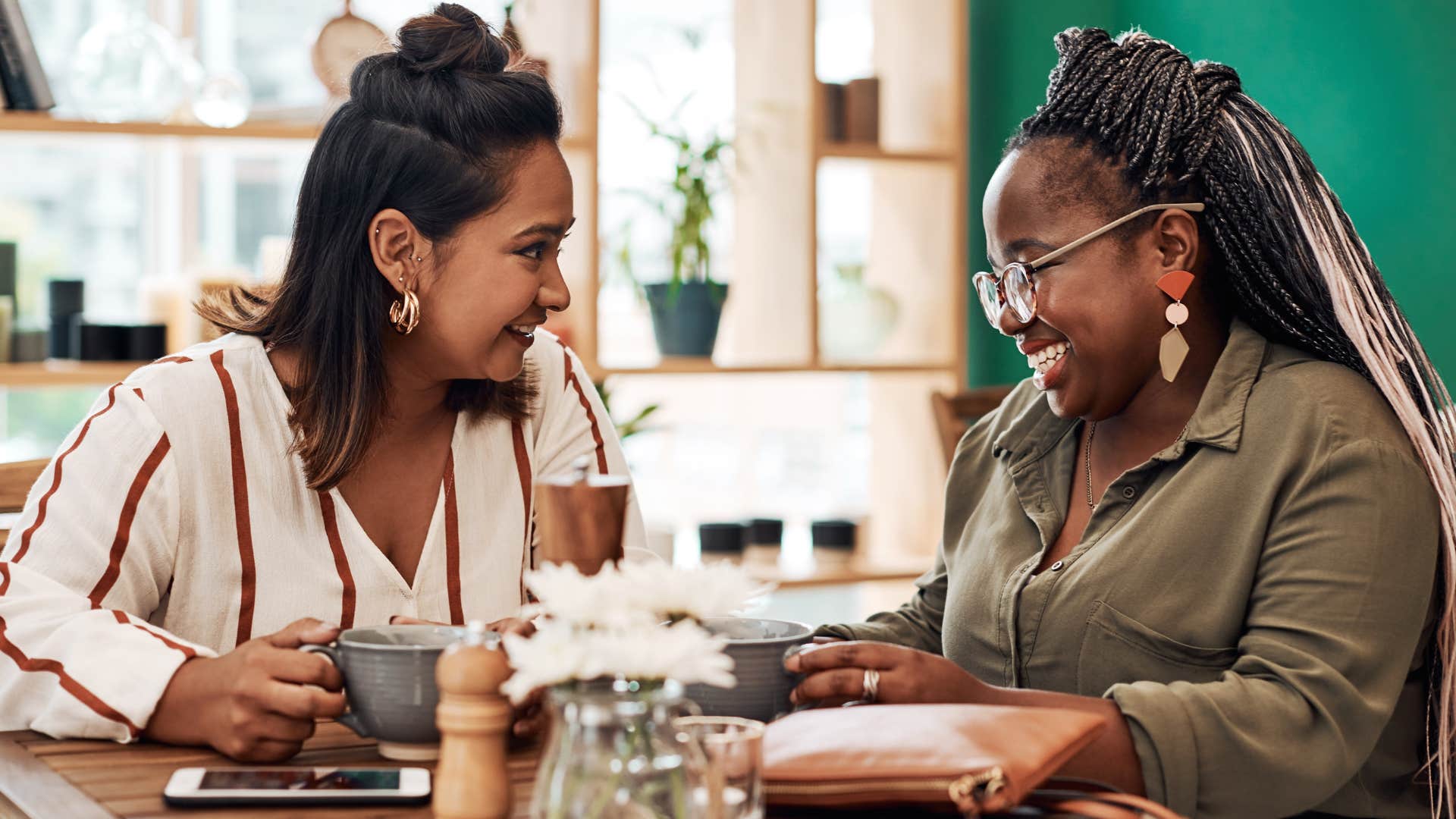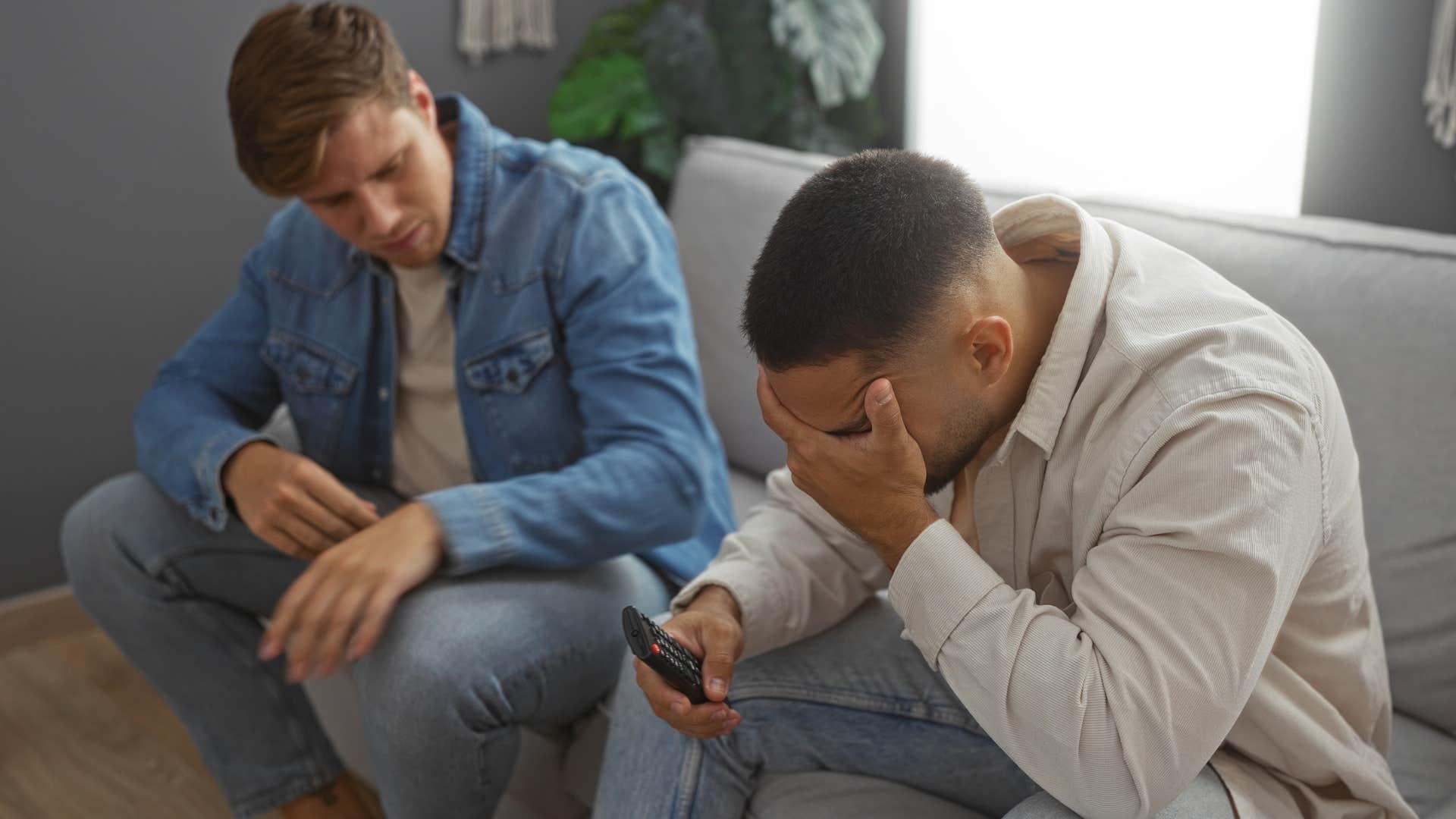11 Awkward Greetings That Instantly Reveal Someone Lacks Any Sort Of Confidence
These greetings put negative thoughts in other people's heads before they have a chance to do that themselves.
 Anatoliy Karlyuk / Shutterstock
Anatoliy Karlyuk / Shutterstock While insecurity and low self-esteem may be rooted in different experiences depending on the person, from excessive screen-time and social media, to unresolved trauma and unmet needs, and even social anxiety, they can make daily social interactions and conversations much harder for people who struggle with them. While confident people approach conversations with a baseline level of internal security, less worried about seeking external validation, being accepted, or facing judgment, insecure individuals may try to tailor their language and behaviors to make themselves more palatable to others.
However, many of the awkward greetings that instantly reveal someone lacks any sort of confidence are obvious to more secure people. They not only signal that someone is using people-pleasing to protect themselves from rejection or criticism, but they also reveal a general lack of boundaries, protections, or expectations for both others and their own behavior. The cycle of anxiety, disappointment, and insecurity that fuels people without confidence often sabotages their internal well-being, as well as their relationships.
Here are 11 awkward greetings that instantly reveal someone lacks any sort of confidence
1. ‘Sorry to bother you’
 Dean Drobot | Shutterstock.com
Dean Drobot | Shutterstock.com
People with low self-esteem are constantly apologizing in an attempt to control situations, lessen their burdens on others, and mitigate any potential conflict before it even happens.
“The only way you feel valued is when you’re accepting what you believe is your role — the scapegoat, the caretaker, the martyr. You apologize constantly because you are sorry that you even exist,” therapist Millie Huckabee suggests, “and you don’t value yourself enough to stand behind your own feelings, thoughts, and actions.”
In many cases, this over-apologizing behavior may even encourage other people to take on emotional burdens, as an insecure person shifts conversations to be all about them and their need for reassurance when they’re constantly saying “sorry.” They worry about being a burden, so they apologize, when the true nature of burdens in social interactions is actually their perceived insecurity and need for reassurance.
2. ‘I’m terrible at small talk’
 Fizkes | Shutterstock.com
Fizkes | Shutterstock.com
Insecure people sabotage their social perception before anyone can get a word in, trying to affirm their own internal, misguided beliefs about their lack of self-worth and deservingness of attention, love, and respect. Other people are bred to see you in a more negative light when you’re constantly wishing they would, using phrases like “I’m terrible at small talk” and “nobody likes me” to seek reassurance.
While they may get a few compliments at first, this cycle of seeking attention and validation leads insecure people to a more self-isolated and lonely place in the end.
3. ‘I look so bad right now’
 Antonio Guillem | Shutterstock.com
Antonio Guillem | Shutterstock.com
Many people with low self-esteem constantly yearn for praise and acceptance from others, going to extreme lengths to secure external validation from others, even at the expense of their relationships and social connections.
Ironically enough, they’re also uncomfortable accepting these compliments, putting them in a constant cycle of yearning for attention and bringing a sense of awkwardness to conversations when they can’t simply accept it.
4. ‘I normally don’t do this’
 PeopleImages.com - Yuri A | Shutterstock.com
PeopleImages.com - Yuri A | Shutterstock.com
People with insecure tendencies and low self-esteem are generally more negative, less excited and enthusiastic, and more stressed than the average person, according to a study published in PLOS One. They enter conversations and social interactions with a general level of discomfort and awkwardness that tends to sabotage the energy of others around them.
By using phrases like “I normally don’t do this” when interacting with others, they inadvertently give others misguided impressions of how they should be perceived, without actually saying or doing anything. They sabotage other people’s perceptions of them, set themselves up for failure, and push themselves into a cycle of disappointment where they think discomfort comes from their true self, not the thoughts, phrases, and overcompensating beliefs they bring into conversations.
5. ‘You probably don’t remember me’
 Fizkes | Shutterstock.com
Fizkes | Shutterstock.com
According to Dr. Gregory L. Jantz, assuming the worst, whether it’s putting negative thoughts about yourself in other people’s heads, leaning into social anxiety, or catastrophizing and overthinking about the worst case scenario, almost always confirms it.
When you assume that everyone is annoyed by you, doesn’t remember you, or finds you awkward to be around, your behavior, mentality, and language manifest in a way that confirms your assumptions. To gain respect, feel appreciated, and be worthy of love, you have to first believe it internally. No amount of external praise, acceptance, or reassurance can make those things solidified in your life.
6. ‘I don’t want to be annoying’
 Krakenimages.com | Shutterstock.com
Krakenimages.com | Shutterstock.com
Despite being one of the ways insecure people cope with their fears of rejection and social isolation, constantly seeking reassurance in conversations and relationships is actually associated with a greater risk for depressive symptoms and later interpersonal rejection, according to a study published in the Journal of Clinical Child & Adolescent Psychology.
They use phrases like “I don’t want to be annoying” as an awkward entrance into their conversations or as a precursor to emotional expression, putting negative thoughts into people’s heads for them. While it may feel grounding and offer up a sense of misguided control to people facing emotional turmoil inside, this reassurance-seeking behavior is more detrimental to their personal health than they believe.
7. ‘You probably think I’m weird’
 Mix and Match Studio | Shutterstock.com
Mix and Match Studio | Shutterstock.com
According to a study from the Personality and Individual Differences journal, many people who lack confidence and self-esteem automatically assume that other people are judging and criticizing them, fueled by a fear of rejection in their social interactions. Rather than waiting for their internal thoughts to manifest in reality, they express them openly to take control, using phrases like “I know you probably hate me” or “you probably think I’m weird” to feel more comfortable and reassured.
Even if they’re not directly seeking reassurance, it’s usually what they find in these situations. Still, when an insecure person relies on language like this consistently, it can cause emotional exhaustion, disconnection, and resentment in their relationships.
8. ‘No, you look better’
 Fizkes | Shutterstock.com
Fizkes | Shutterstock.com
Many people with low self-worth or self-esteem may be uncomfortable with compliments because they directly challenge the rigid and deep-rooted thoughts they hold about themselves. They don’t feel pretty, worthy of love and attention, or valuable, so when someone else gives them praise in those areas, they feel disoriented, uncomfortable, and even mistrusting of that person.
Instead of simply expressing gratitude and saying “thank you,” they instead direct compliments with a phrase like “no, you look better” or “Have you seen yourself?” to avoid their discomfort. Ironically, it’s often praise and acknowledgement that insecure people seek, but when they actually receive it, from a genuine perspective, it can cause awkwardness and discomfort in social situations.
9. ‘I’ll leave you alone’
 Fizkes | Shutterstock.com
Fizkes | Shutterstock.com
Many people who lack confidence assume that others share their own judgmental and critical thoughts about them. However, the harshest critic in these situations for insecure people is always themselves. Usually, nobody else is holding them to unrealistic expectations or expecting them to act in a certain way.
That’s why phrases like “I’ll leave you alone” or “I don’t want to burden you” are awkward greetings that instantly reveal a lack of confidence. They suggest someone believes everyone else is equally annoyed, frustrated, and burdened by their presence.
“If you're afraid of being judged or feel like you don't belong, you're probably isolating yourself,” neuropsychologist Dr. Sanam Hafeez argues, “which will only feed your feelings of inadequacy.”
By avoiding conversations and shutting down vulnerability out of fear in social situations, people who lack confidence not only spark discomfort and awkwardness, but they also sabotage their ability to grow and lean into discomfort that builds self-esteem.
10. ‘I actually did that too’
 Fizkes | Shutterstock.com
Fizkes | Shutterstock.com
Many insecure people resort to overcompensation, where they overachieve and brag about a certain area in their life to compensate for their perceived shortcomings in another, or undercompensation, growing overly dependent on others to compensate for those points of insecurity, when they lack confidence.
They may enter into a conversation with a phrase like “I actually did that too” to brag or “one-up” someone else to compensate for their insecurities, at the expense of true connection and conversation with others. They view their worth only in the context of external things, like acceptance, validation, or success, so when they try to connect with others, it’s almost always in the framework of those things, rather than their internal thoughts, emotions, and personality.
11. ‘I didn’t realize that was you!’
 GaudiLab | Shutterstock.com
GaudiLab | Shutterstock.com
Positive and healthy relationships tend to boost self-esteem, but for insecure people struggling with social anxiety, vulnerability, and internal security, finding a partner, a good friend, or a social network can be a struggle. Not only do they tend to struggle with opening up, actively listening, and being present in social interactions, but they sometimes avoid them entirely to protect themselves from discomfort or fear.
When they see someone they know, they pretend like they’re not there or walk away, using a phrase like “oh, I didn’t realize that was you” when they’re caught. Many of the awkward greetings that instantly reveal someone lacking any sort of confidence are subtle, but rooted in larger behaviors and tendencies, like social anxiety and avoidance, that are hard to miss.
Zayda Slabbekoorn is a staff writer with a bachelor’s degree in social relations & policy and gender studies who focuses on psychology, relationships, self-help, and human interest stories.

